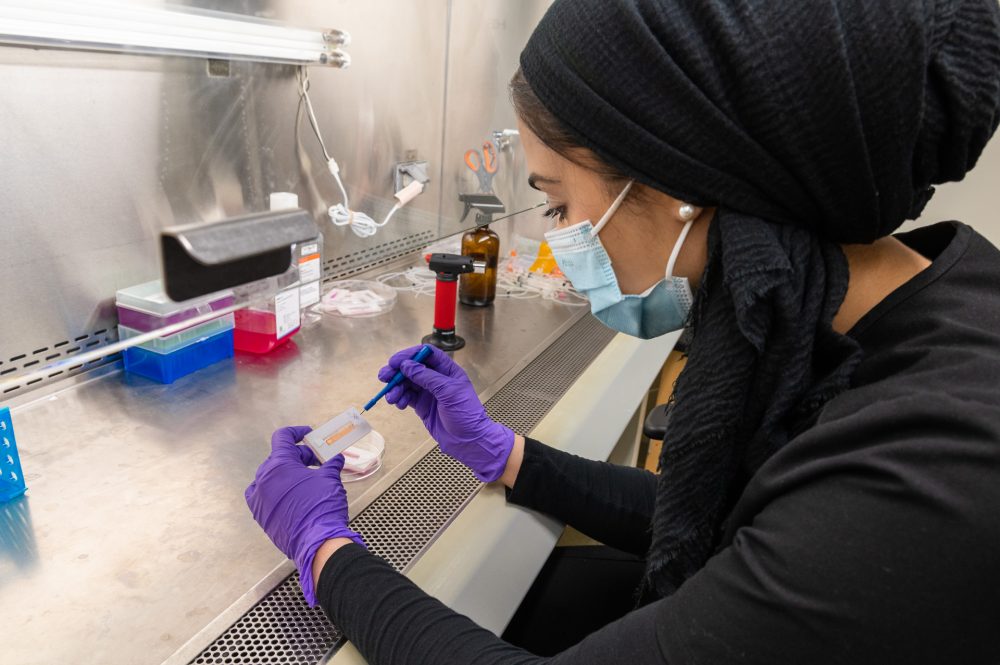The TIP Innovation Fellowship program is an immersive, experiential learning opportunity for students to engage in real-world technology commercialization and entrepreneurship. The program pairs students at tech startups in UConn’s Technology Incubation Program (TIP) for mentored summer experiences.
Since its founding in 2012, the program has placed 189 students in 60 university-affiliated technology start-ups. This year’s cohort of 33 UConn students is a mix of undergraduates and graduate students from about 20 different majors in business, life sciences, health, and engineering.
Most of the students are Connecticut residents and a quarter of them from traditionally under-represented groups. Many participants are the first members of their families to attend college.
The robust participation in the program corresponds to growing interest among students in entrepreneurship, as well as UConn and the state’s expansion and emphasis on technology development, says program director Caroline Dealy.
“To move our global world forward, we have so many problems to solve,” said Dealy. “We need all kinds of people working creatively together. This program is a unique way to prepare students for the future. I’m hoping it will grow the next generation of problem solvers and solution builders we need.”
This year, 220 students applied to the program. Host startup companies in UConn’s TIP (Technology Incubation Program) extended 51 offers to mentor fellows – a 117% increase since 2015 – but only 33 could be accommodated due to limited funds.
“UConn has been extremely supportive of the program but keeping pace with demand will require corporate patrons and private donors to sponsor named student fellowships,” said Dealy, who founded the program and is an assistant professor at UConn Health.
“Our goal is to impact as many students as possible,” Dealy continued. “We could have more than 50 students if we had the funding. Our growth is driven by the number of companies that recognize the value of hosting. For long-term sustainability, the program needs dedicated financial and administrative support that grows with the program’s needs.”
Unlike conventional internships, the TIP Innovation Fellowship Program is an academic entrepreneurship experience designed to provide real-world experience in how innovative ideas and cutting-edge technologies become the products and services that benefit health and society. TIP is a division of UConn’s Technology Commercialization Services.
Asirva Alahari, a fellow at Frequency Therapeutics – a Farmington TIP start-up – says that’s exactly what attracted her to the program.
“I wanted to get a feel for a real company,” said Alahari, a rising sophomore in the School of Engineering’s Manufacturing Engineering Management program. “I wanted to be able to be a part of a company making an impact and exploring new frontiers.”
The fellows have proven themselves to be valuable assets to the startups where they mentor.
“It’s an incredible program,” said Melissa Hill-Drzewi, a Senior Quality Assurance Manager at Frequency Therapeutics and Alahari’s mentor. “It’s a great way for students to experience what working in a startup environment is like. It’s much different from working in a corporate environment because you get to wear many hats.”
“They are seeing the good, the bad, and the extreme challenges of being involved with a startup,” added Frank Kuchinski, a co-founder of Foot Traffic Stats, a TIP Digital company in Stamford hosting three fellows who are creating a people activity sensing platform to help communities and small businesses make better decisions using realtime foot traffic data and infographics. “A lot of the things we work on, we don’t even know the answers. Being able to work with ambiguity is such a valuable skill. A product is a series of unknowns. Some people are comfortable with that, some people can’t handle that. We are trying new things every day.”
The program’s academic structure includes training in entrepreneurship through summer seminars and workshops that cover business development and strategy, patents, venture finance and professional career development. Many fellows stay on with host startups after the summer ends as either part-or full-time hires, or to extend their summer projects into longer-term academic honors, capstone, or scholar’s research. TIP Fellows will share their summer projects at UConn Summer Research Day on July 29.
“I’ve always been a STEM person, but I also knew I wanted to get involved in business,” said Alahari. “The TIP Fellows Program has both, which taps into my engineering and tech background, but you learn leadership skills and how to network.”
“The program seminars have been extremely interesting to me,” said Emma Graebner, a fellow at Oscillo, another TIP Farmington start-up. “TIP really fosters the business side of STEM education. That’s something I really didn’t expect, but really enjoy.”
Oscillo, a company focused on combining music and neuroscience to fight Alzheimer’s disease, was co-founded by Edward Large, a professor of psychological sciences and physics at UConn and director of UConn’s Music Dynamics and Theoretical Neuroscience labs. While not directly involved in product development, Graebner, a rising senior majoring in music and statistics, is able to contribute her knowledge of music and statistics in support of the company enterprise.
“Because I’m a music major, I can tweak things about the device, such as how the light works with the beat,” she said. Her knowledge of statistics has helped her put together data presentations that are easily understood by non-experts. Other tasks have ranged from taking notes at company meetings to maintaining a participant recruitment website.
Hill-Drzewi said she interviewed five or six students from the pool of 220 applicants for the single spot at Frequency Therapeutics.
“I tried to pick the one that would be the best fit for our needs,” she said of Alahari. “It’s a shame we didn’t have spots for additional candidates, but I’m a one man operation at Frequency in Farmington and I could only commit to one.”
The students will present posters and oral presentations on their experiences during Summer Research Day festivities in the UConn Health Academic Rotunda in Farmington on Friday, July 29. The event runs from 9:30 a.m. to 2:30 p.m.



